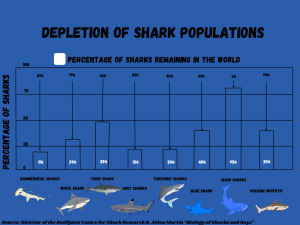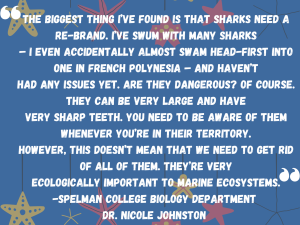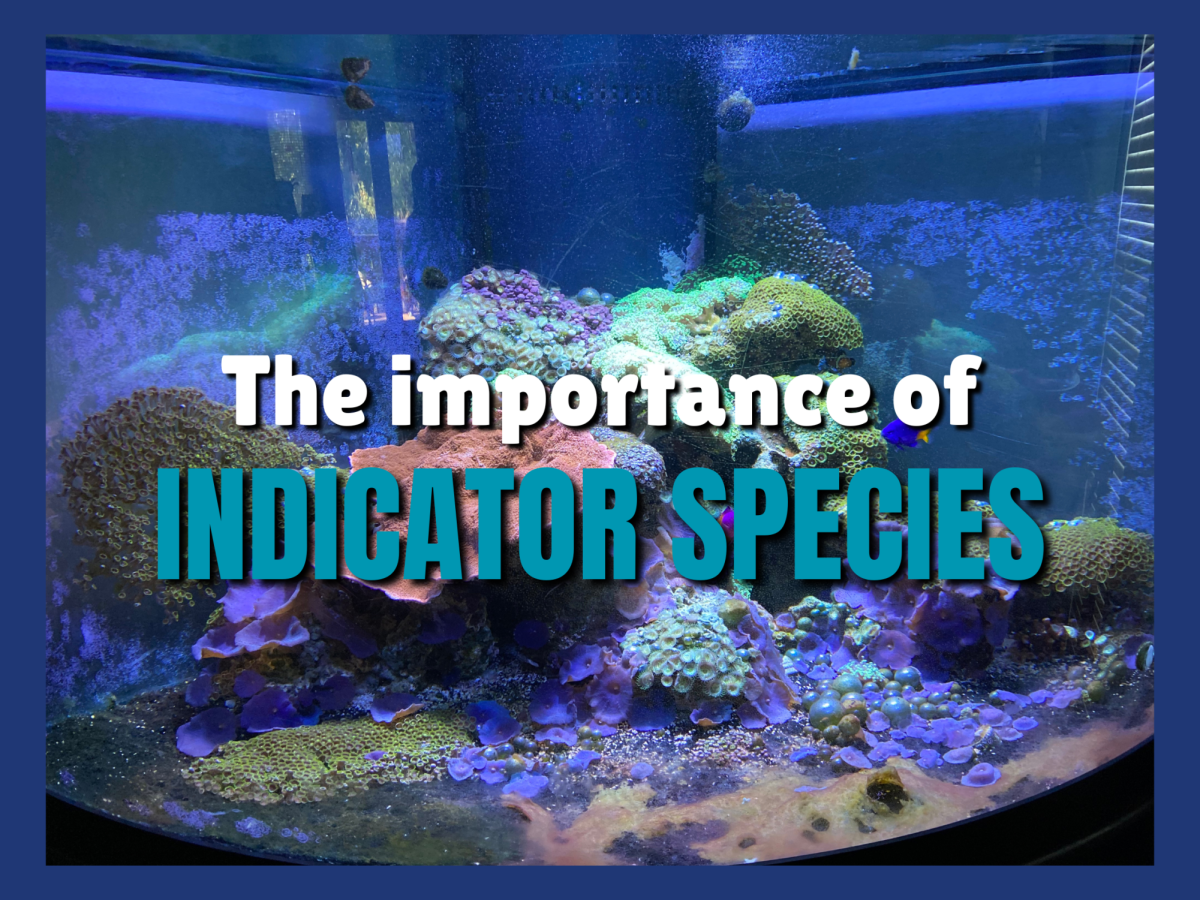In the deep blue sea, a lone shark glides effortlessly through the water, its every movement contributing to the ocean’s delicate balance. But when the roar of engines breaks the peace on the surface and a hook suddenly plunges towards the shark, the predator becomes the prey. The beauty of a once peaceful ocean begins to crumble due to the removal of this crucial predator. Annually, millions of sharks fall in danger of poachers who hope to profit off of their fins or organs, or the animals die simply because people fear them. One shark’s death may seem insignificant, but without sharks, the balance of the sea crumbles as well as the society that people know and love. Poachers continue to decrease shark population leading to the disappearance of these creatures and the world they help to flourish, leaving the once-beautiful ocean in shambles.
“The loss of something at the top of the food chain can have a cascading impact on everything below it. With climate change, although there are a few different potential issues, the main two problems are ocean warming and ocean acidification. The climate change warming problem is the same as on land and in freshwater systems– it could get simply too warm for some organisms to be able to handle where they currently live. There may be the potential for some marine organisms to acclimate or adapt, but it’s really hard to predict. We are seeing the migration of organisms into areas where they previously were not found (Vergés et al. 2014), likely due to temperature changes. I would argue that the best thing people can do is learn about these issues and use the information to make informed decisions as much as possible,” Spelman College Biology department lecturer Dr. Nicole Johnston said.
People perceive sharks as a class of fish that lurks in the deep parts of the ocean, waiting to attack. However, Psychologists Brian Tuckfield and Jason Encel claim that humans’ primal instincts motivate their intense fear of sharks. Based on primal intuition, people have an instinct that causes a fear of creatures that could eat them. While individuals identify sharks as horrific fish, these apex predators play an important role in maintaining the ecosystem’s complex balance that keeps oceans healthy. For instance, the presence of tiger sharks prevents green turtles from overgrazing seagrass beds, so creating healthy populations of sharks and turtles remains critical to the structure and function of the seagrass ecosystem. Since 1970, sharks have continued to decline by 71% annually, causing an 18-fold increase in relative fishing pressure. In a study conducted by the International Union for the Conservation of Nature (IUCN), researchers identified 121 shark species as endangered and 180 as vulnerable out of the 1,199 species assessed. Overall, 31.2% of sharks face a risk of extinction.

Overfishing, which commonly arises from the lack of management to ensure shark fisheries continue to fish sustainably, remains the main source of the shark’s depleted populations. When fishermen decide to hunt sharks, they do not consider the marine animals’ slow reproduction. The reason for overfishing lies in a popular Asian dish that uses shark fins, and even though the meal remains prohibited in numerous countries, people continue to ignore the policies. Annually, the demand for the fins included in the soup kills approximately 73 to 100 million sharks for their fins and causes over 100 million sharks to fall victim to anglers who placed them back into the ocean after acquiring their fins in 1993. When fishermen throw these marine creatures back into the ocean, the shark population depletes, and the problem becomes exacerbated by inactivity in society to protect this marine life. The lack of shark protection policies also plays a role in the population decrease around the country.
In 2014, the Oceanic Whitetip became an endangered shark species. The shark involved once served as a common shark in the open ocean, but the Oceanic Whitetip has transitioned into one of the top ten endangered predatory fish. The Oceanic Whitetip remains threatened partly because the Regional Fishery Management Organizations (RFMOs) fail to fully address the shark’s decline. Even with laws such as the 2010 Shark Conservation Act, research suggests that change needs to happen to help shark populations recover from the last 50 years of exploitation.

“People can help conserve shark life throughout their daily lives by spreading awareness through social media such as posting informational pics. Soon this [extinction of sharks] will lead to people not being able to eat certain fish, especially in places closer and farther from water. This extinction will throw off the food chain, there will be too many fish that were supposed to be eaten by the apex predators and a smaller amount of fish that were supposed to eat those apex predators. Climate change and pollution surrounding the marine ecosystem will cause the soon extinction of marine animals. As well as, leading to zero clean water for animals or people to drink leading to sickness and the ultimate fall of different breeds and the human race,” sophomore Zuri MacKenzie said.
Generally, sharks live for 20-100 years, but the rise of the microplastic invasion cuts their lifespan in half. Sharks accumulate toxins through direct or indirect digestion, which occurs when the plastics enter two primary pathways to sharks’ intestines. Direct digestion occurs when certain shark species filter feed on microplastics that resemble algae while indirect digestion happens when a shark feeds on a fish that previously consumed microplastic. Sharks remain at the top of the food chain by consuming around 13.75 to 82.5 pounds of fish a day; because of this, the microplastics that they could potentially digest can cause painful effects to their body before they die, such as intestinal damage that harms the digestive tracts and other internal tissues.
As a result of the overfishing and pollution, sharks may cease to exist. Based on the International Union for the Conservation of Nature (IUCN) Red List of Threatened Species, over one-third of shark species stand as endangered, and in a minimum of 10 years,the shark population will reach its limit, causing terrific damage to the ocean and mankind. Without sharks, the entire high sea ecosystem will fall out of balance, disrupting the lower levels of the food chain as well as affecting the maintenance of the seagrass and coral reef habitats. If sharks cease to exist, predatory fish such as groupers will grow in abundance and feed on an excessive amount of herbivores. As herbivores decrease in the ocean, macroalgae expands and coral can no longer compete, creating an algae-dominant ocean, which will impact the survival of the reef system. If the ocean’s lifecycle falls apart, diseases will rise alongside the decrease in biodiversity.
“I have a good understanding of both sharks and the ocean’s habitat. Sharks provide a huge amount of food for the food web and ecosystem by keeping it balanced. It would do harm because the habitats that sharks inhabit would be infested with animals that could not be removed. It [climate change and pollution] will hurt the ecosystem because most fish or marine animals require the water to be a certain temperature,” sophomore Ella Anderson said
The loss of sharks would directly impact the world’s economy. Without those apex predators, other species, such as rays, remain unchecked and consume a majority of the creatures that humans eat, forcing fisheries to shut down. The Chondrichthyans group’s main threats include overexploitation alongside overfishing, and this excessive fishing will negatively affect the habitat of the ocean as well as climate change. The U.S. places policies that fisheries and poachers refuse to follow which loses the U.S. an immense amount of revenue. Annually, the U.S. misses between $51 billion and $83 billion in unrealized net economic benefits due to the overexploitation and underperformance of fish stocks.
Society can come together to perform actions that could help sharks stay in the ocean such as choosing sustainable source seafood. When shopping at the local supermarket, seafood lovers can look for Marine Stewardship Council (MSC) certified fisheries; these fisheries manage shark populations and help them recover in the ecosystem. Organizations that label the seafood as MSC certified can possibly pay off third parties to falsely label the fish which can cause problems when people want to decide which foods to choose from. The U.S. and countries in Europe and South America remain an impactful exporter of shark meat. These providers normally sell this meat with mislabels claiming its MSC certification.
Consumers can also look out for certain cosmetics and medicines such as anti-aging creams and certain health drinks. Shark meat does not remain the only practice that harms sharks. Now, certain cosmetics and medicines can lead to the animals’ deaths. Skincare products that use squalene, a natural oil that comes from shark’s liver, increase hydration and reduce inflammation to treat acne and eczema. To obtain high amounts of squalene, fishermen illegally poach sharks, cutting down their population by 500,000 annually. If the demand for these cosmetics and shark meat sales declines, the products will eventually hold close to no value and sharks could flourish once more.
“Some of the main problems that sharks face are overfishing due to the use in a lot of edible dishes, especially their fins while the rest is thrown away. So I would say if people really wanted to attempt to conserve sharks, they should do some research of their own and people talk about protesting with their wallets so they could refrain from purchasing those kinds of ingredients that use sharks. Sharks are pretty interesting because they do have some uses for humans. When people think of sharks they think of shark attack movies and that’s all that sharks are but that’s not the case. There are only about five species that are considered man-eaters, but going back to how we utilize sharks, we need them for certain health conditions,” Zoology teacher Jarrett McCall said.
Even though protecting sharks can take a backseat to other environmental goals, spreading the word around will help support the cause of helping the sharks inhabit a safe environment. During June and August, Shark Week occurs to dispel the misconceptions about sharks. The television show aired its first episode in 1988, sparking the interest of viewers worldwide and this attention began to help conserve this fish’s population. The occasion sheds light on the crucial role that sharks play in marine ecosystems and the challenges to conserve them, becoming an important advocate on behalf of sharks to resolve the misbelief of them as mindless eating machines. Shark Week remains an important voice to protect the marine ecosystem and ocean health.
















